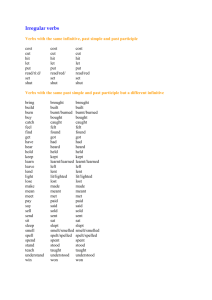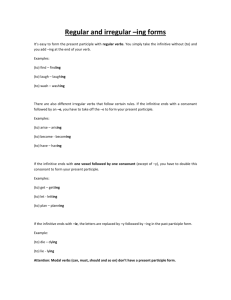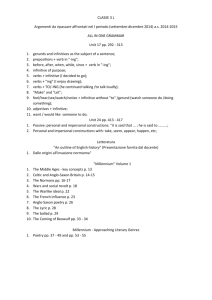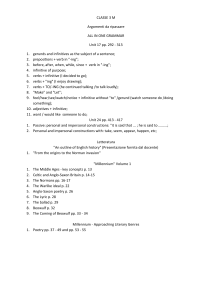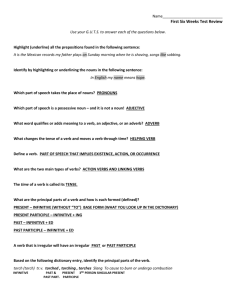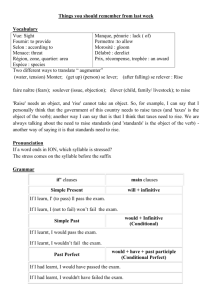Haaga-Helia 1 of 4 22 September 2007 Verbs in Brief (1) Questions
advertisement
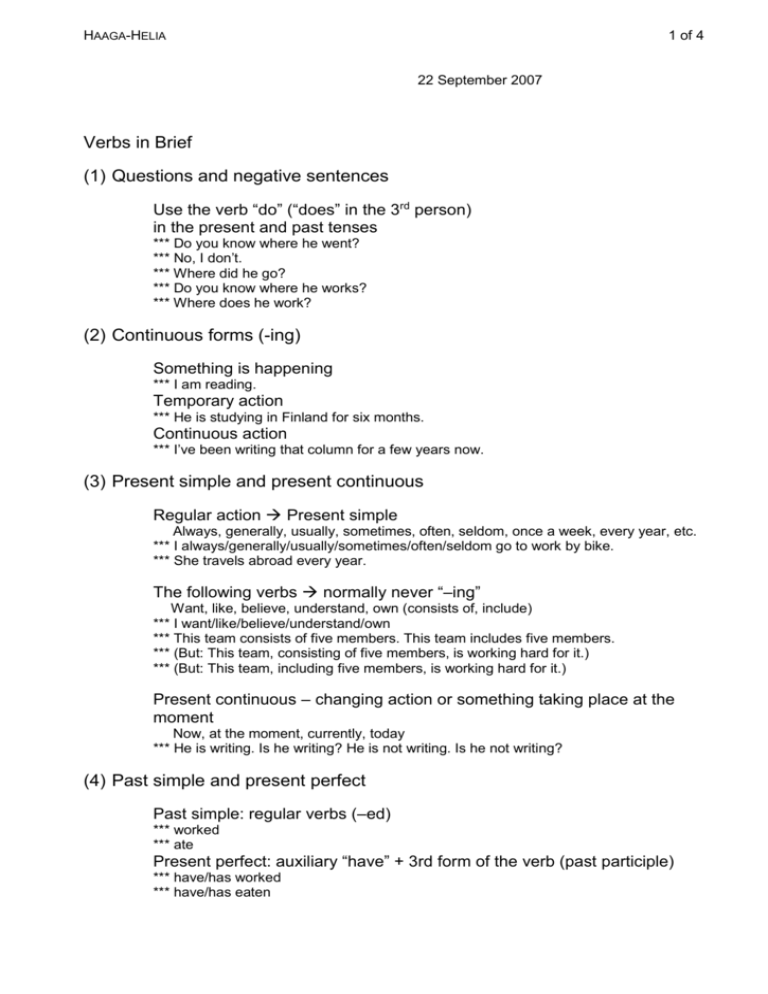
HAAGA-HELIA 1 of 4 22 September 2007 Verbs in Brief (1) Questions and negative sentences Use the verb “do” (“does” in the 3rd person) in the present and past tenses *** Do you know where he went? *** No, I don’t. *** Where did he go? *** Do you know where he works? *** Where does he work? (2) Continuous forms (-ing) Something is happening *** I am reading. Temporary action *** He is studying in Finland for six months. Continuous action *** I’ve been writing that column for a few years now. (3) Present simple and present continuous Regular action Present simple Always, generally, usually, sometimes, often, seldom, once a week, every year, etc. *** I always/generally/usually/sometimes/often/seldom go to work by bike. *** She travels abroad every year. The following verbs normally never “–ing” Want, like, believe, understand, own (consists of, include) *** I want/like/believe/understand/own *** This team consists of five members. This team includes five members. *** (But: This team, consisting of five members, is working hard for it.) *** (But: This team, including five members, is working hard for it.) Present continuous – changing action or something taking place at the moment Now, at the moment, currently, today *** He is writing. Is he writing? He is not writing. Is he not writing? (4) Past simple and present perfect Past simple: regular verbs (–ed) *** worked *** ate Present perfect: auxiliary “have” + 3rd form of the verb (past participle) *** have/has worked *** have/has eaten HAAGA-HELIA 2 of 4 22 September 2007 Special characteristics (a) Past simple (action has started and ended in the past, generally with an adverb defining the time *** I wrote two reports yesterday. (b) Present perfect (action started in the past but is still going on) *** I have worked as a journalist for a long time. (c) Present perfect in Finnish, past simple in English: *** I was born in Helsinki. *** Laihian Nuuka Lämpö Oy was established in 1998. (5) Future Auxiliary shall/will *** I shall/will, you will, he/she will, we shall/will, you will, they will Do not use the future tense in subordinate clauses expressing time and starting with one of the following words: If, unless, when, as soon as, while, before, after, until/till *** If you go home tomorrow, I will go with you. *** I will call you as soon as I get home. *** They will write it before they go home today. *** After I finish my meeting, I will check my email. *** I will wait until you get here. Future continuous: will + be + ing form *** When will you be visiting me again? *** We’ll be seeing you again next month. Future perfect: will + auxiliary “have” + 3rd form of the verb (past participle) *** They will have singed the agreement before noon tomorrow. Future perfect continuous *** In August I will have been working for this company for 19 years. Expressions of intention To be going to + infinitive *** We are going to introduce many new products in the coming months. To intend to + infinitive *** He intends to contact her soon. To plan to + infinitive *** We plan to launch a major advertising campaign. (6) Conditional Would + basic form of the main verb/would + auxiliary “have” + 3rd form of the verb (past participle) Used in polite speech. *** Would you do that for me? HAAGA-HELIA 3 of 4 22 September 2007 In an if-clause, use the past tense or the past perfect. *** I would be happy if I knew the truth. *** We would have been happy if they had joined us. Should, ought to, could, might (7) Passive Object in the active clause Subject in the passive clause Subject in the active clause “by” + agent *** We organised the conference. The conference was organised by us. Pay attention to the position of the preposition “of” in the following: *** Our team will take care of the guests. The guests will be taken care of by our team. (8) Infinitive without particle “to” With auxiliary verbs *** I do like it. *** I will call you. After the active form of verbs expressing sense perception See, hear, watch, feel *** I have seen him fly many times. (But: I saw him standing in the hall.) After the active form of the verbs “make” and “let”. *** She makes me smile. *** Let me help you. (9) Verbs with the infinitive … to do something *** I cannot afford to buy a new computer. *** They agree to pay the bill. *** He will arrange to have the summit on these premises. *** I choose to read the longer version. *** They decided to stay one more day. *** He failed to arrive on time. *** Don’t hesitate to call me. *** Did you manage to find the book? *** Do you mean to close the operations? *** Don’t neglect to call the customer. *** She offered to finish my report. *** They persuaded me to come here. *** You promised to write it by tomorrow. *** What do you propose to do? *** I refuse to discuss it any further. *** We seem to succeed quite well. *** We have undertaken to keep the prices low. HAAGA-HELIA 4 of 4 22 September 2007 (10) Gerund (-ing form) and present participle Present participle *** We met some smiling people Ing-form *** Smiling is good for you. *** He enjoys cooking. *** Writing this article took me the whole day. *** The writing of this article took me the whole day. With prepositions *** He was interested in hearing more. With certain verbs *** I admit loving you. *** I appreciate having you in my life. *** They avoid working overtime. *** Please consider coming along. *** Let’s not delay sharing the news. *** Don’t deny having said so. *** I dislike arguing with them. *** They enjoy listening to music. *** Have you finished reading the paper? *** Keep going! *** Do you mind leaving me alone? *** I have to postpone writing that story. *** Many people put off going to the doctor. *** I want to practise speaking English. *** Let’s not risk losing him. *** Please stop teasing me. Verb form Active (3rd form) Passive (3rd form) Present simple Present continuous Past simple Past continuous Present perfect Past perfect Future Future continuous Future perfect Conditional Perfect conditional Present infinitive Perfect infinitive Present participle / gerund Perfect participle Writes Is writing Wrote Was writing Has written Had written Will write Will be writing Will have written Would write Would have written To write To have written Writing Having written Is written Is being written Was written Was being written Has been written Had been written Will be written Will have been written Would be written Would have been written To be written To have been written Being written Having been written

